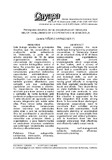Mostrar el registro sencillo del ítem
Principales desafíos de las cooperativas en Venezuela
| dc.rights.license | http://creativecommons.org/licenses/by-nc-sa/3.0/ve/ | |
| dc.contributor.author | Piñeiro Harnecker, Camila | |
| dc.date.accessioned | 2009-03-09T20:45:42Z | |
| dc.date.available | 2009-03-09T20:45:42Z | |
| dc.date.issued | 2009-03-09T20:45:42Z | |
| dc.identifier.issn | 1317-5734 | |
| dc.identifier.uri | http://www.saber.ula.ve/handle/123456789/27081 | |
| dc.description.abstract | Este trabajo analiza los principales desafíos que las cooperativas de producción están enfrentando en Venezuela, a partir de un estudio empírico de 15 de estas organizaciones, entrevistas a conocedores del cooperativismo, y una revisión bibliográfica sobre el tema. Se encontró que un número considerable de cooperativistas venezolanos presentan deficientes capacidades administrativas y técnicas, así como problemas de motivación. Las cooperativas tienen también grandes dificultades para competir con sus contrapartes capitalistas por insumos y clientes. Su dependencia de instituciones estatales para tener acceso a capital y contratos de venta también está poniendo en peligro su sustentabilidad. Y esta situación es agravada por la escasa integración que existe entre ellas. Para vencer estos desafíos, las cooperativas venezolanas deben coordinar sus actividades entre ellas y con las comunidades. Una tal coordinación o planificación democrática además serviría para consolidar sus principios éticos y organizativos, y para transformarlas en verdaderas empresas socialistas que satisfagan necesidades sociales efectiva y eficientemente | es_VE |
| dc.rights | info:eu-repo/semantics/openAccess | |
| dc.subject | Autogestión | es_VE |
| dc.subject | Solidaridad | es_VE |
| dc.subject | Motivación | es_VE |
| dc.subject | Eficiencia | es_VE |
| dc.subject | Planificación democrática | es_VE |
| dc.title | Principales desafíos de las cooperativas en Venezuela | es_VE |
| dc.title.alternative | Major challenges of cooperatives in Venezuela | es_VE |
| dc.type | info:eu-repo/semantics/article | |
| dc.description.abstract1 | This paper analyzes the main challenges being faced by production cooperatives in Venezuela, based on an empirical study of 15 of these socioeconomic organizations, interviews with persons knowledgeable about cooperatives in that nation, and a survey of publications on this topic. My research found that a considerable number of cooperative members present serious deficiencies in administrative and technical skills, as well as motivation. Cooperatives are also having great difficulty in competing with their capitalist counterparts for inputs and clients. Their dependency on state institutions for access to capital and sale contracts is also threatening their sustainability. And this situation is aggravated by the little integration that exists among them. To overcome these challenges, Venezuelan cooperatives need to coordinate their activities among them and with communities. Such democratic planning or coordination would also serve to consolidate their organizational and ethical principles, and to transform them into true socialist enterprises that effectively and efficiently satisfy social need | es_VE |
| dc.description.colacion | 37-60 | es_VE |
| dc.description.email | camila.ph@gmail.com | es_VE |
| dc.description.frecuencia | semestral | |
| dc.identifier.depositolegal | 200102ME988 | |
| dc.subject.centroinvestigacion | Centro de Investigaciones para el Desarrollo Integral Sustentable (CIDIS) | |
| dc.subject.facultad | Núcleo Rafael Rangel (NURR) | es_VE |
| dc.subject.keywords | Solidarity | es_VE |
| dc.subject.keywords | Self-management | es_VE |
| dc.subject.keywords | Motivation | es_VE |
| dc.subject.keywords | Efficiency | es_VE |
| dc.subject.keywords | Democratic planning | es_VE |
| dc.subject.publicacionelectronica | Cayapa | |
| dc.subject.seccion | Revista Cayapa: Las cooperativas de trabajo asociado | es_VE |
| dc.subject.tipo | Revistas | es_VE |
| dc.type.media | Texto | es_VE |
Ficheros en el ítem
Este ítem aparece en la(s) siguiente(s) colección(ones)
-
Cayapa - Año 008 - Nº 015
enero - junio 2008



